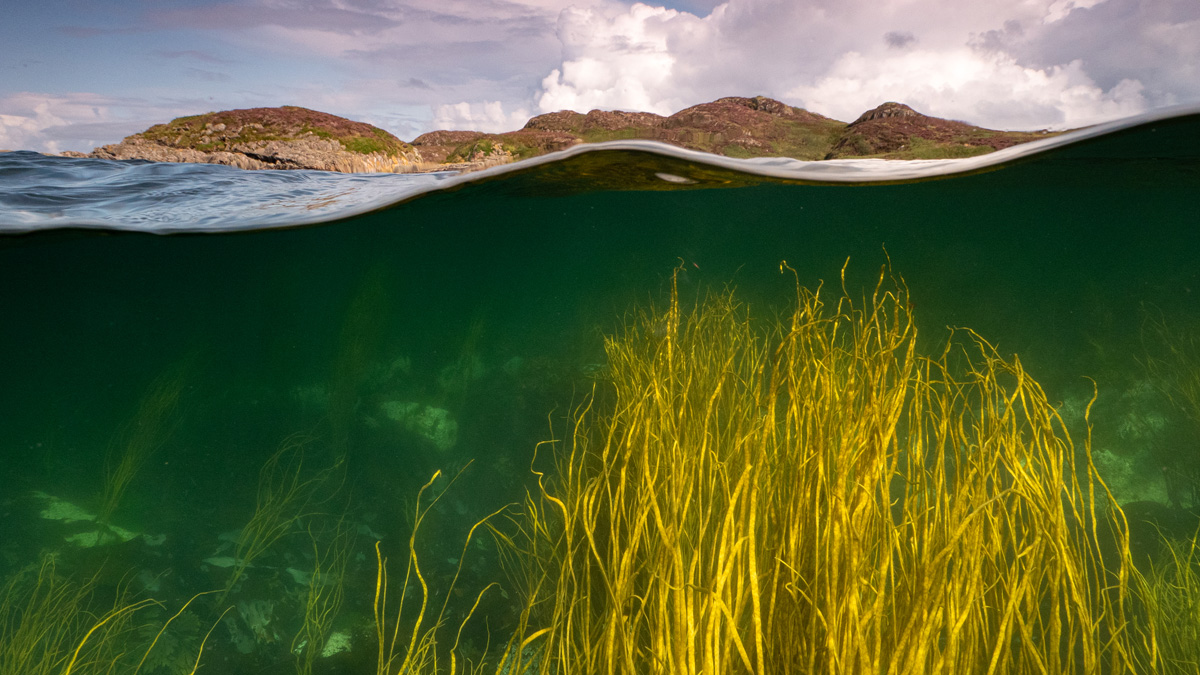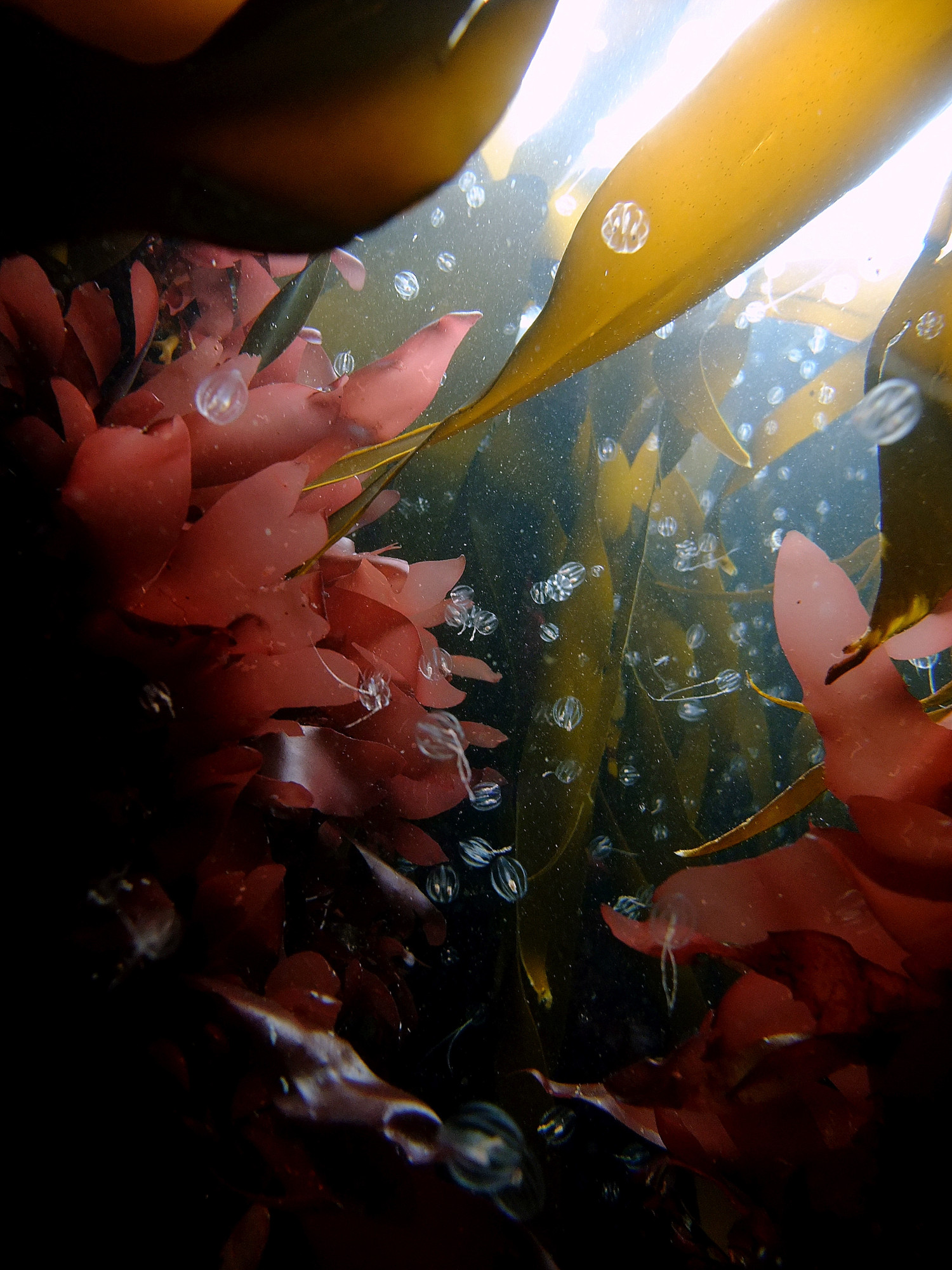Marine Life & Conservation
The ocean’s solution to the climate emergency

 The Marine Conservation Society has released a new report in partnership with Rewilding Britain. Blue Carbon – Ocean-based solutions to fight the climate crisis outlines the importance of the UK’s seas in helping the UK to reach its goal of net zero by 2050, and 2045 for Scotland.
The Marine Conservation Society has released a new report in partnership with Rewilding Britain. Blue Carbon – Ocean-based solutions to fight the climate crisis outlines the importance of the UK’s seas in helping the UK to reach its goal of net zero by 2050, and 2045 for Scotland.
In order to reach net zero, the quantity of carbon dioxide taken from the atmosphere and stored in natural solutions must increase. By protecting and rewilding ecosystems in our ocean, blue carbon stores will have increased capacity and ability to store carbon.
The significant role of the world’s forests in helping to reduce carbon emissions has been formally recognised through numerous initiatives and reforesting projects intended to keep carbon locked into the world’s forests on land. Unfortunately, equivalent solutions in the ocean are often overlooked. In order to reach its goal of net zero by 2050, the UK must look to blue carbon solutions in tandem with those on land.
What is blue carbon?
Marine ecosystems like seagrass meadows, saltmarshes and mangroves absorb or ‘draw down’ carbon from the water and atmosphere, just like plants and trees on land. The storage of carbon in marine habitats is called blue carbon. The storage of blue carbon can be in the plants themselves, like seaweed and seagrass; in the seafloor sediment where plants are rooted; or even in the animals which live in the water, including seabirds, fish and larger mammals. Blue carbon is simply carbon absorbed from the water and atmosphere stored in the world’s blue spaces.
Dr Chris Tuckett, Director of Programmes at the Marine Conservation Society: “Carbon contained in marine and coastal ecosystems must be considered in the same way as our woodlands and peatbogs…critical to the UK’s carbon strategy. Our report outlines how vital blue carbon solutions are to an effective strategy which reaches net zero by 2050.
“We’re calling on the UK Government and devolved administrations to act with urgency to invest in, co-develop and implement a four nation Blue Carbon Strategy.”
The suggested strategy focuses on three key action areas:
– Scaling up marine rewilding for biodiversity and blue carbon benefits
– Integrating blue carbon protection and recovery into climate mitigation and environmental management policies
– Working with the private sector to develop and support sustainable and innovative low-carbon commercial fisheries and aquaculture.
Globally, the rewilding of key blue carbon securing marine and coastal ecosystems such as seagrass beds, saltmarshes and mangroves could deliver carbon dioxide mitigation amounting to 1.83 billion tonnes. That is 5% of the emissions savings we need to make globally. This figure doesn’t include the enormous quantities of carbon stored in fish and other marine life; in marine ecosystems such as coral reefs, seaweeds and shellfish beds; or the vast stores of carbon in our seabed sediments.
Rebecca Wrigley, Rewilding Britain’s Chief Executive: “We’re calling for the rewilding and protection of at least 30% of Britain’s seas by 2030. Allowing a rich rainbow of underwater habitats and their sealife to recover offers huge opportunities for tackling the nature and climate crises, and for benefiting people’s livelihoods,”
“From Dornoch Firth to Lyme Bay, inspiring projects are leading the way by restoring critically important seagrass meadows, kelp forests and oyster beds. Combined with the exclusion of bottom towed trawling and dredging, such initiatives offer hope and a blueprint for bringing our precious seas back to health.”
Later this year, the UK will be hosting COP26 – the UN Climate Change Conference – in Glasgow. The conference brings together world leaders to accelerate action towards the goals of the Paris Agreement and the UN Framework Convention on Climate Change. The ocean and its blue carbon stores are a crucial part of the many urgent and varied solutions required to address the climate crisis.
The UK has committed to significantly increase its spending on nature-based solutions, including those offered by the ocean. The Marine Conservation Society and Rewilding Britain are calling on UK governments to adopt ocean-based solutions at pace and scale by 2030.
The report, Blue Carbon – Ocean-based solutions to fight the climate crisis, is available to read at the Marine Conservation Society’s website.
Header image: Mark Kirkland
Marine Life & Conservation
GROUNDTRUTH collaborates with PADI on pioneering submersible collection

GROUNDTRUTH, a story-led material innovation company that is fast forging a reputation for its next generation travel gear, is thrilled to announce its collaboration with the world’s largest diving association – PADI – on a range of pioneering submersible bags.
Entitled UNDA, Latin for wave, the collaborative range sets a new standard in sustainable design, with the GROUNDTRUTH team transforming the standard drybag into a future-focused travel companion, representing the two partners’ shared philosophy of ocean and environmental protection.
The 100% recycled bag range’s proprietary material is made from plastic waste including ghost fishing nets, post-consumer Nylon and plastic bottles. It is used alongside GROUNDTRUTH’S own patent-pending GT-OCO-CO2® hardware range, made from recycled plastic and captured CO2 emissions.
With a presence via 6,600 dive centres and resorts in 184 countries and territories throughout the world, PADI has amassed a hugely engaged community of 30 million+ divers to date. This collection creates a platform to highlight the shocking / mind blowing impact of plastics affecting our blue planet while actively contributing to its removal – empowering people from around the globe to take meaningful action to protect what they love.
“We are incredibly excited to partner with PADI on this project which will be launched via PADI’s global diving network and via our own channels,” said Georgia Scott, Co-founder and CEO of GROUNDTRUTH. “Ghost fishing nets account for over 50% of all plastic waste in our oceans, causing irreversible damage to global marine ecosystems. By combining our expertise in innovative design with PADI’s dedication to Ocean conservation, we aim to make a significant positive impact through the repurposing of these harmful plastics. GROUNDTRUTH was created with the value that all consumer products should contribute to a safer planet.”
“We are proud to collaborate with GROUNDTRUTH, as this partnership exemplifies our shared mission to mobilize the global community of Torchbearers who actively explore and protect our ocean,” said Lisa Nicklin, Vice President of Growth and Marketing for PADI Worldwide “Together, we’ve revolutionized the way that divers can carry around their essentials while elevating their commitment to protecting the place they love. It’s truly a product line designed by divers, for divers.
The UNDA range will be available for pre-order through www.groundtruth.global from the 3rd of February 2025 with PADI members being given the first opportunity to buy via their channels. Join us in this pioneering initiative to explore, protect, and preserve our oceans for future generations.
For more information about the GROUNDTRUTH x PADI collaboration, click here.
About GROUNDTRUTH®
GROUNDTRUTH sparks a new generation of travel gear that enables and accelerates positive change, making a transformative impact to industries, processes and people. As a green technology business and lifestyle brand, at the heart of GROUNDTRUTH is the exploration and development of new materials crafted from the world’s pollution and plastic waste. Their patent-pending GT-OCO-CO2® hardware range, created from recycled plastic and captured CO2 Emissions, is a world first.
Utilising their origins as investigative documentary filmmakers, sisters and founders Georgia, Sophia and Nina Scott, have hand-built GROUNDTRUTH’s unique Bluesign® certified supply chain ecosystem with partners who share the brand’s ethos for people and our planet. Their mission and products are created to support and empower individuals who are making a difference, both in their communities and around the world.
About PADI®
PADI® (Professional Association of Diving Instructors®) is the largest purpose-driven diving organization with a global network of 6,600 dive centers and resorts, 128,000 professional members and more than 29 million certified divers to date. Committed to our blue planet, PADI makes the wonder of the underwater world accessible to all, empowering people around the world to experience, explore and take meaningful action, as Ocean TorchbearersTM, to protect the world beneath the surface. For over 50 years, PADI is undeniably The Way the World Learns to Dive®, setting the standard for the highest quality dive training, underwater safety and conservation initiatives while evolving the sport of diving into a passionate lifestyle. For divers by divers, PADI is obsessed with transforming lives and, with its global foundation, PADI AWARETM, creating positive ocean change. Seek Adventure. Save the Ocean.SM
Marine Life & Conservation
Go Diving Show 2025 UK Stage Speaker: Lloyd Rees-Jones

Sharks dwell off the UK coastline, but did you know there is one that glows in the dark? Join Lloyd Rees-Jones at this year’s GO Diving Show in March when he takes to the UK Stage to showcase a very different side of our marine life when viewed in a different light (no pun intended!).
Lloyd Rees-Jones is a HSE Part 4 Media Diver, PADI Master Scuba Diver Trainer, underwater videographer and seasoned volunteer with Neptunes Army of Rubbish Cleaners (NARC). For almost 20 years he has been completely captivated by three shore diving locations in Pembrokeshire, West Wales, and every year he discovers something new that fills him with excitement for the season ahead and keeps him going back year after year.
Ultraviolet night diving in Pembrokeshire
Lloyd’s talk on the UK Stage will be about marine fluorescence and the nocturnal activities of our favourite coastal species, and will give a glimpse on how ultraviolet night diving has the potential to rekindle our passion for night diving – and also the hidden benefits it can bring to our UK diving adventures.
Go Diving Show 2025 takes place at the NAEC Stoneleigh Park, Coventry, on the 1st -2nd March.
-

 Gear Reviews2 months ago
Gear Reviews2 months agoGear Review: SurfEars 4
-

 Marine Life & Conservation2 months ago
Marine Life & Conservation2 months agoPaul Watson Released as Denmark Blocks Japan’s Extradition Bid
-

 Blogs3 months ago
Blogs3 months agoExperience Malta and Gozo in 2025: A Paradise for Divers and Culture Lovers
-

 News1 week ago
News1 week agoHumpback Mother and Calf Win Underwater Photographer of the Year 2025
-

 Blogs3 months ago
Blogs3 months agoJeff Goodman Launches Underwater Moviemaker Course with NovoScuba
-

 News2 months ago
News2 months ago2-for-1 tickets now available for GO Diving Show
-

 News3 months ago
News3 months agoDive into Adventure: Limited Space Available for January Socorro Liveaboard Trip with Oyster Diving
-

 News2 weeks ago
News2 weeks agoGo Diving Show 2025 Exhibitor Showcase

















